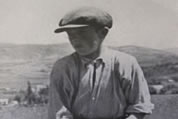Can Jews Become Farmers? Rurality, Peasantry and Cultural Identity in the World of the Nineteenth Century Lithuanian Rural Jew

Can Jews Become Farmers? Rurality, Peasantry and Cultural Identity in the World of the Nineteenth Century Lithuanian Rural Jew
Based on conventional wisdom, supported also in no small measure by stereotypes, agriculture as a vocation was not considered as part of the occupational profile of Jewish society in Eastern Europe until World War II. However, various studies show that in different places in this region, primarily Lithuania, White Russia and Bessarabia, tens of thousands of Jews, living in small villages and farms, made a living from direct engagement in various branches of agriculture, including field crops, orchards, lake fishing, etc. Following the first part of my talk in which I will present some figures of this phenomenon, I will examine the possible influence of the agricultural occupation on the shaping of a unique peasant cultural identity among these rural Jews and the ways they coped with the accompanying religious, social and cultural implications.
Mordechai Zalkin is an associate professor of modern Jewish history in the Jewish History department at Ben-Gurion University of the Negev. His special fields of interest are the history of Lithuanian Jewry as well as the cultural, educational and social transformation east European Jewry underwent during the nineteenth and early twentieth centuries.

